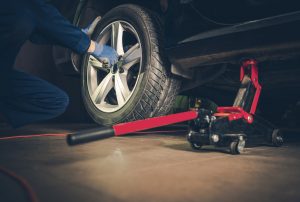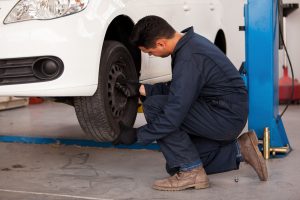The benefits of a tire rotation
The benefits of a tire rotation
A majority of vehicle manufacturers around the world will recommend that drivers rotate their tires every 5000-9000 miles depending on various factors: braking habits, tire brand, amount of miles driven each day, daily road conditions previously driven on, and the type of vehicle. The tire rotation procedure usually involves moving the tires and rims from front to back or vice versa and then crossing each part. Cars need to be lifted off of the ground to have the rims and rubber thoroughly inspected. Your regularly scheduled oil change or other maintenance services may be the perfect time to ask for an inspection and tire rotation.

The heat from the friction and pressure while driving on the roads is a tire’s worst enemy. When a vehicle is moving on the road there will always be heat generated from the wheels and rims spinning at fast speeds.
The better, newer rubber of the bunch should be placed on the rear-wheel axle for better handling. The front-wheel tires will lose traction before the back ones; therefore, an oversteer reaction will occur.
It is much harder to correct a vehicle in the instance of understeer compared to oversteer. If a back piece loses grip or bursts, there is a higher chance of the vehicle sliding perpendicular to the direction the vehicle is traveling. This is especially common at fast speeds. The rubber units can separate from the rims when a vehicle is spinning across lanes on the road, and if dirt, grass, or other foreign materials get stuck in between the rims and tires, the car may start flipping uncontrollably until the momentum of the vehicle is stopped.
If a vehicle alignment is off balance and the car continuously turns towards one particular side of the road, the driver will usually correct the situation by turning against the tendency of the vehicle. That is another common reason for wearing down wheels faster than usual.
Do you rotate your wheels? What is holding you back?
Each rim and rubber piece wears down at a different rate. The front-wheel axle wheels lose tread a lot faster than the wheels connected to the rear-wheel axle. The wheels at the front of the vehicle work harder to steer and stop the vessel. The large, heavy engine parts at the front of cars can put more stress on the front units. Depending on the type of vehicle you drive (front-wheel drive or rear-wheel driver), the axle in the front or back may heat up faster than its counterpart.

Why should I rotate my tires?
Some experts say that consistent rotation of wheels can lead to the prolonged life of each rubber unit. Here are three reasons why you might want to rotate your tires:
1) A consistent rotation schedule will help keep the car balanced and improve traction in potentially hazardous conditions. A vehicle takes almost twice as long to come to a complete stop with rain or sleet on the roads than it would if the roads were clear. A tire rotation specialist should be able to give you updates on the tread life of your wheels at each visit. There are diagrams that show when your vehicle is drifting into the “danger zone.”
2) Vehicle manufacturers often require you to make regular tire rotation appointments. Your warranty may no longer be valid if you decide to skip out on the vehicle tire rotation appointments. This is just another incentive to keep your tires in good shape. There are companies that are more than happy to rotate your rims for free or a small price. Discount Tire employees will always complete a tire rotation task for their customers for free. Most service centers will offer you a free tire rotation service any time you buy a new piece of rubber.
3) If you prefer to buy a set of four tires every time a new set is needed rather than buy one or two at a time, a tire rotation will ensure that each individual unit wears evenly. That way you will not have to buy individual units or an odd set every time you need to replace vehicle parts. Driving around town with four wheels that all lose tread at a similar rate will make it easier for you, the driver to remember when a new set of rubber is needed. Every time a new set of wheels is added to the car, you can feel the benefits of new tire technology evenly.
To sum all this information up in a paragraph, the question, should I get a tire rotation? can best be answered by your vehicle’s manufacturer and some personal data diving on the internet. Some cars and trucks are built with wheels that cannot be rotated. BMW is one of those brands. They make the perfect vehicle that is naturally balanced and wears out rubber evenly. On the contrary, there are plenty of other brands that will require frequent tire rotations – as mentioned earlier – to keep the warranty valid. At the end of the day, it is up to the driver. There are resources all over the Internet, and if you do not trust what you read online, ask the staff at your local dealership about the benefits of tire rotation.
